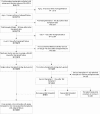Transplant nephrectomy improves survival following a failed renal allograft
- PMID: 19875809
- PMCID: PMC2834539
- DOI: 10.1681/ASN.2009050480
Transplant nephrectomy improves survival following a failed renal allograft
Abstract
There is a growing number of patients returning to dialysis after a failed kidney transplant, and there is increasing evidence of higher mortality among this population. Whether removal of the failed renal allograft affects survival while receiving long-term dialysis is not well understood. We identified all adults who received a kidney transplant and returned to long-term dialysis after renal allograft failure between January 1994 and December 2004 from the US Renal Data System. Among 10,951 transplant recipients who returned to long-term dialysis, 3451 (31.5%) received an allograft nephrectomy during follow-up. Overall, 34.6% of these patients died during follow-up. Receiving an allograft nephrectomy associated with a 32% lower adjusted relative risk for all-cause death (adjusted hazard ratio 0.68; 95% confidence interval 0.63 to 0.74) after adjustment for sociodemographic characteristics, comorbidity burden, donor characteristics, interim clinical conditions associated with receiving allograft nephrectomy, and propensity to receive an allograft nephrectomy. In conclusion, within a large, nationally representative sample of high-risk patients returning to long-term dialysis after failed kidney transplant, receipt of allograft nephrectomy independently associated with improved survival.
Figures



Comment in
-
Allograft nephrectomy after transplant failure: should it be performed in all patients returning to dialysis?J Am Soc Nephrol. 2010 Feb;21(2):207-8. doi: 10.1681/ASN.2009121262. Epub 2010 Jan 14. J Am Soc Nephrol. 2010. PMID: 20075065 No abstract available.
-
Transplantation: Nephrectomy of a failed allograft decreases mortality.Nat Rev Nephrol. 2010 May;6(5):248. doi: 10.1038/nrneph.2010.47. Nat Rev Nephrol. 2010. PMID: 20440865 No abstract available.
-
Getting it Straight: Avoiding Blunders While Criticizing a Peer's Work.Int J Epidemiol. 2016 Jun;45(3):619-20. doi: 10.1093/ije/dyv154. Epub 2015 Aug 14. Int J Epidemiol. 2016. PMID: 26275449 No abstract available.
-
Immortal time bias. Response to: Achinger, Go and Ayus.Int J Epidemiol. 2016 Jun;45(3):965-6. doi: 10.1093/ije/dyv300. Epub 2015 Nov 11. Int J Epidemiol. 2016. PMID: 26559545 No abstract available.
References
-
- US Renal Data System: USRDS 2005 Annual Data Report: Atlas of End-Stage Renal Disease in the United States, Bethesda, National Institutes of Health, National Institute of Diabetes and Digestive and Kidney Diseases, 2005
-
- Schnuelle P, Lorenz D, Trede M, Van Der Woude FJ: Impact of renal cadaveric transplantation on survival in end-stage renal failure: Evidence for reduced mortality risk compared with hemodialysis during long-term follow-up. J Am Soc Nephrol 9: 2135–2141, 1998 - PubMed
-
- Wolfe RA, Ashby VB, Milford EL, Ojo AO, Ettenger RE, Agodoa LY, Held PJ, Port FK: Comparison of mortality in all patients on dialysis, patients on dialysis awaiting transplantation, and recipients of a first cadaveric transplant. N Engl J Med 341: 1725–1730, 1999 - PubMed
-
- Ojo A, Wolfe RA, Agodoa LY, Held PJ, Port FK, Leavey SF, Callard SE, Dickinson DM, Schmouder RL, Leichtman AB: Prognosis after primary renal transplant failure and the beneficial effects of repeat transplantation: Multivariate analyses from the United States Renal Data System. Transplantation 66: 1651–1659, 1998 - PubMed
-
- Kaplan B, Meier-Kriesche HU: Death after graft loss: An important late study endpoint in kidney transplantation. Am J Transplant 2: 970–974, 2002 - PubMed
Publication types
MeSH terms
Grants and funding
LinkOut - more resources
Full Text Sources
Other Literature Sources
Medical

